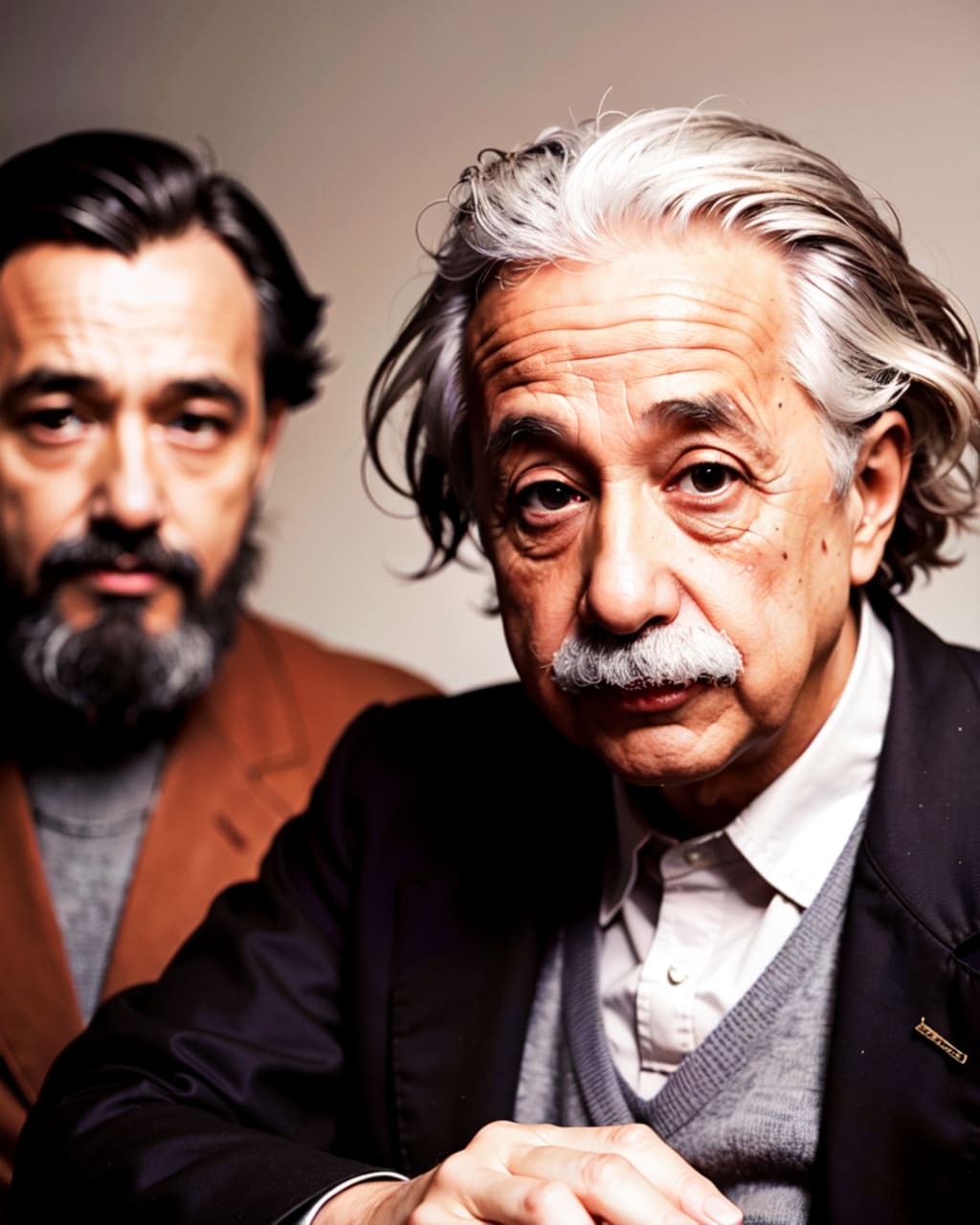"The Cosmic Dialogue: Einstein and Plato Unravel the Secrets of the Universe"
"Exploring the Interplay Between Science and Philosophy in the Quest for Ultimate Truth"

In a universe of vast dimensions and unresolved mysteries, imagine for a moment a hypothetical conversation between two of the most brilliant minds in history: Albert Einstein and Plato. These two geniuses find themselves in a timeless space, debating and exploring the confines of the known universe. In this imaginary dialogue, wisdom and reason intertwine as Einstein and Plato unravel the secrets of the cosmos and its ultimate meaning.
Einstein, with his characteristic humility and his ability to challenge the status quo, begins the conversation: "Plato, modern physics has revealed an astonishing and complex world. Through my theories of relativity, I have shown that space and time are interconnected and malleable entities. However, I wonder if our limited perceptions truly allow us to comprehend the magnitude and essence of the universe."
Plato, with his idealistic philosophy and inclination towards transcendent ideas, responds: "Albert, your work has revolutionized our understanding of the physical world, but have you considered how these theories align with the notion of an eternal and immutable universe? In my philosophy, I argued that the sensible world is only an imperfect shadow of eternal and perfect Ideas."
Einstein reflects on Plato's words and responds with a smile: "Plato, your focus on eternal Ideas is intriguing. In my research, I have sought the fundamental laws that govern the observable universe. Could there be an underlying truth beyond our perceptions that drives the laws of physics?"
Plato nods and continues, "Albert, consider this: our human minds are limited, and our perceptions are influenced by sensory experience. But beyond this, isn't there a universal cosmic order that guides us towards truth? Isn't there a transcendent reality underlying all things that we can grasp only through pure reason?"
Einstein ponders Plato's words and, with a thoughtful look, responds: "Plato, your vision of a transcendent reality is captivating. Although my work has focused on understanding physical laws, I have come to recognize that the mystery of the universe cannot be solely solved through science. Philosophy and introspection also play a crucial role in our quest for ultimate truth."
Plato, with a penetrating gaze, adds, "Albert, as you rightly say, science and philosophy must come together to fully comprehend the universe. Reason guides us towards truth, but we must also seek meaning beyond the physical laws. What is the purpose of the universe? Is there a divine order underlying its creation?"
Einstein smiles, and his gaze lights up with a spark of curiosity, "Plato, the question of the purpose of the universe has haunted me for a long time. Although my focus has been on the scientific aspect, I cannot ignore the need to explore the limits of consciousness and existence. Perhaps, in that quest, we can discover the true meaning of the universe."
Plato nods with satisfaction and concludes, "Albert, together, science and philosophy can lead us to new frontiers of knowledge and understanding. Through reason and contemplation, we can transcend our limitations and approach the essence of the universe. Let us continue exploring, challenging, and questioning, in search of the ultimate truth that will reveal the secrets of the cosmos."
In this imaginary conversation between Einstein and Plato, we see how science and philosophy intertwine, mutually complementing each other in the pursuit of ultimate truth. As these two great minds delve into the mysteries of the universe, they invite us to reflect on our own perceptions and understanding of reality. What is our role in this vast cosmos? How can we combine reason and contemplation to achieve a deeper understanding?
While the dialogue between Einstein and Plato is fictional, its purpose is to inspire us to explore beyond our limitations and recognize the interconnectedness between science and philosophy. In the quest for knowledge and meaning, we can move towards a greater understanding of the universe and ourselves.
About the Creator
Enjoyed the story? Support the Creator.
Subscribe for free to receive all their stories in your feed. You could also pledge your support or give them a one-off tip, letting them know you appreciate their work.





Comments
There are no comments for this story
Be the first to respond and start the conversation.